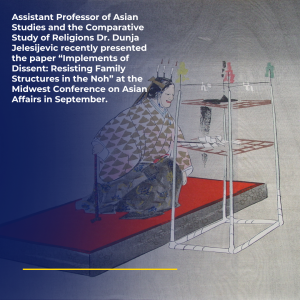Assistant Professor of Asian Studies and the Comparative Study of Religions Dr. Dunja Jelesijevic recently presented the paper “Implements of Dissent: Resisting Family Structures in the Noh” at the Midwest Conference on Asian Affairs in September.
Abstract: The 14th century Nō plays Kanawa and Kinuta take as the subject matter marital relationships, betrayal, and abandonment. In Kanawa, husband takes a mistress, upon which his wife seeks to exact revenge by ritually transforming into a demon, with an iron trivet – normally used for cooking – representing demonic horns. In Kinuta, the wife attempts to call back her long-absent husband by beating on a fulling block used for laundry. In both plays, the betrayed wives use household implements – markers of domesticity, to express their resentment and rebel against the fate to which they are expected to be resigned. Analyzing the two plays, my presentation explores how domesticity, originally posited as a source of confinement and subjugation of the female, is turned into a tool of dissent. She sought to elucidate the ways in which the medium of nō is used to challenge and destabilize the prescribed social order, familial structure, and gender roles.
